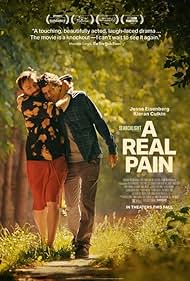Mismatched cousins reunite for a tour through Poland to honor their beloved grandmother, but their old tensions resurface against the backdrop of their family history.. When Benji and David visit their grandmother’s home in Poland, the location is where Jesse Eisenberg&# 39;s real-life ancestors settled in diaspora.. Benji Kaplan: We stay moving, we stay light, we stay agile.David Kaplan: Yeah.Benji Kaplan: The conductor’s gonna come through, taking tickets, we tell him we’re going to the bathroom.David Kaplan: Bathroom.Benji Kaplan: He gets to the back of the train, he starts heading towards the front looking for stragglers.David Kaplan: Sorry, we’re the stragglers ?Benji Kaplan: Yeah. By the time he gets to the front, the train’s gonna be in the station and we’re home free. David Kaplan: This is so fucking stupid. Tickets are probably like twelve bucks. Benji Kaplan: It’s the principle of the thing. We shouldn’t have to pay for train tickets in Poland. This is our country. David Kaplan: No, it’s not, it was our country. They kicked us out ’cause they thought we were cheap.. Featured in CBS News Sunday Morning: Episode #46.44 (2024). 12 Etudes, Op. 25, No. 3 in F majorWritten by Frederic ChopinPerformed by Tzvi Erez. Jesse Eisenberg’s second effort as writer-director sets out to be something unconventional. There’s something of Richard Linklater’s BEFORE trilogy in the DNA of A REAL PAIN, with some recognizable inheritance from Michael Winterbottom’s TRIP series also apparent. The perambulatory pacing, the languorous cinematography that asks you to look beneath the surface of touristy sights, the dialogue that meanders through an unpretentious and unstructured unpacking of the meaning of life, the total absence of any "bad guys," the near total absence of any outright conflict, the barest hint of any goal guiding the plot aside from the completion of a simple itinerary… A Real Pain shares all these realistic features with those earlier, more spirited, life-affirming films. Yet somehow… it doesn’t quite work. I’m not sure what was at fault with why I never really got into this movie. I think a large part of it has to do with all the supporting characters (i.e. Everyone besides the cousins played by Eisenberg and Kieran Culkin). Will Sharpe’s non-Jewish tour guide, the Rwandan convert, the old couple, the sexy divorcee… the characters are all very basic, very conventional, very boring. The actors who play them are fine, but there’s not much they’re given to do, and so they seem unnatural and lifeless, more like set decorations than people. Eisenberg knows how to direct a camera, I think; he knows how to put the proper cinematic elements in place. But perhaps he doesn’t know how to direct actors, or maybe he just doesn’t know how to write characters. There’s never anything to suggest that these people exist beyond the moments we see them in, which perhaps could’ve been fixed with some more spontaneous improvisation from the actors. Eisenberg and especially Culkin are better in this regard, but there’s still something rather stilted and "written" about a lot of what they say and do. Eisenberg's "workaholic salesman with OCD" is largely one-dimensional, and the few times where his character expands beyond that facade seem more like forced acting than any kind of genuine glimpse into something deeper. Culkin is wonderful–a glimpse perhaps of his Succession character if Roman Roy actually cared about people–but I think that’s just a credit to Culkin’s talent; he somehow manages to transcend what he’s been given to work with. This is a decent indie film with a few good laughs, a couple of interesting ideas, a memorable tour of Poland, and a solid performance from Culkin.




 48/17
48/17